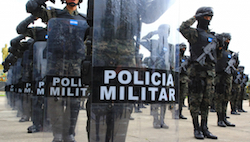Evidence suggests Honduras’ use of the military to conduct domestic policing has increased human rights violations by soldiers. Yet the country’s corrupt and ineffective police force offers an equally unpleasant alternative for combating widespread insecurity.
According to data collected by Reuters, between 2012 and 2014 Honduran soldiers were implicated in at least nine murders, over 20 cases of torture, and around 30 illegal detentions. At least 24 soldiers are currently under investigation on charges related to nine murder cases.
Reuters found no such cases involving soldiers were reported in 2010 and 2011. In 2012, former Honduran President Porfirio Lobo turned to the military to fight drug gangs.
“The number of human rights violations by the military is rising, and the threat is greater and growing because military police operate with their faces covered and without visible identification, which fans impunity,” said Juan Almendarez, the director of a center that treats torture victims and their relatives.
Honduras’ Interior Minister Rigoberto Chang, while admitting there have been cases of military abuse, said, “The presence of soldiers on the streets will continue until security is reestablished,” reported Reuters.
Those who support using the military in a policing role say it has helped reduce Honduras’ homicide rate, which the United Nations estimated was over 90 murders per every 100,000 people in 2012. Honduras’ National Autonomous University estimated the 2014 murder rate at 68, down from 79 in 2013.
InSight Crime Analysis
While using the Honduran military to conduct domestic policing functions is far from ideal, the alternative is equally dismal. Indeed, the main reason Honduras turned to the military in the first place is because the country’s police forces are notoriously corrupt and ineffective.
SEE ALSO: Coverage of Police Reform
For example, on June 9, officers from Honduras’ National Police presented President Juan Orlando Hernandez with their most recent internal report; which found attempts to purge the police of corruption and enact reform have completely failed, and that at least 27 officers (including a number of commissioners and deputy commissioners) have links to organized crime groups responsible for — among other crimes — drug trafficking, kidnapping, car theft, and murder.
Nonetheless, it is rare for police officers implicated in criminal activities to face prosecution, with many managing to remain on the force. Additionally, Honduran police have also proven prone to committing abuses and human rights violations. Between 2010 and 2012, police were responsible for around 150 civilian deaths.
Honduras thus finds itself in a dilemma, which, in recent years, politicians have attempted to resolve by creating new military police forces: special force squad the Tigers and the military police. Despite the expansion of these forces, however, their role in improving Honduras’ security situation remains unclear.

